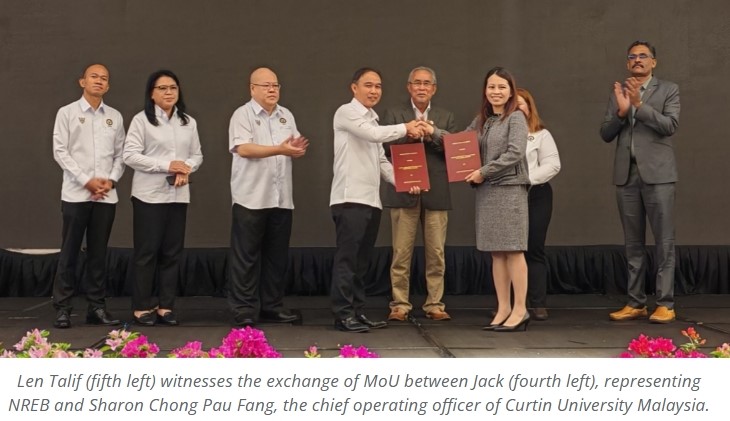by jenifer laeng

MIRI (July 16): Sarawak is laying the groundwork to assume greater autonomy in environmental governance as part of its long-term commitment to sustainable development and climate action, said Datuk Len Talif Salleh.
The Deputy Minister of Urban Planning, Land Administration and Environment said that the state is preparing for the eventual enforcement of Article 95C of the Federal Constitution, which would allow Sarawak to independently legislate on environmental matters.
“In anticipation of this, the Sarawak State Legislative Assembly has passed the Natural Resources and Environment Ordinance 2024, laying a strong legal foundation for the state’s full assumption of environmental functions.
“The transition will be implemented in phases, beginning with scheduled waste management this year, followed by regulation of industrial effluents, air quality control, and Environmental Impact Assessments (EIAs),” he said when officiating at the Stakeholder Engagement Programme (SEP) 2025 at a hotel here today.
As part of the preparations, Len Talif said the Natural Resources and Environment Board (NREB) is drafting the necessary subsidiary regulations to ensure that Sarawak is fully ready to implement and enforce these functions once the transfer of powers is formalised.
Len Talif, who is also NREB deputy chairman, stressed that environmental protection is not the sole responsibility of government.
“Effective environmental governance relies not only on strong legislation but also on clear procedures, professional integrity, and a collective commitment to responsibility,” he said.
He pointed out that all prescribed development activities are required to undergo EIAs, which must be site-specific and grounded in scientific principles, and these assessments are to be conducted by registered environmental consultants.
He also reminded developers and project proponents to take environmental obligations seriously.
“Environmental responsibility must begin at the planning stage. Compliance with EIA terms and conditions is not optional, it is a legal and moral obligation. Environmental Monitoring Reports (EMRs) must reflect actual site conditions, and be submitted promptly, with integrity and transparency,” he said, adding that these reports are crucial for tracking compliance, identifying emerging issues, and ensuring that mitigation measures are properly implemented on the ground.
Len Talif also emphasised that accurate and timely data is essential for sound environmental decision-making.
“The findings shared today on river water quality highlight the need to strengthen our monitoring systems. At present, NREB still relies heavily on manual sampling, with only one telemetric station currently in operation,” he said.
He voiced full support for NREB’s efforts to expand the telemetric water quality monitoring network across Sarawak.
“Real-time data is not a luxury, it is a necessity for early detection, timely intervention, and science-based environmental management. I trust this initiative will continue to receive the support and resources needed to better protect our rivers,” he said.
He added that protecting rivers must be a collective responsibility, especially from those involved in land development and urban commercial activities.
Touching on waste management, Len Talif revealed that a master plan on Integrated Waste Management is currently being developed to enhance the state’s waste governance and align with Sarawak’s climate agenda.
He said that the master plan will provide a strategic framework for managing municipal solid waste, scheduled waste, as well as construction and demolition waste.
“The study, with Bintulu identified as the pilot location, is expected to be completed by the end of this year. The master plan will outline strategic directions and key actions to support Sarawak’s aspiration of achieving net zero carbon emissions by 2050, while also promoting environmental protection, resource efficiency and the adoption of circular economy practices,” he said.
Meanwhile, controller of Environmental Quality Sarawak Datu Jack Liam in his welcoming speech stated that to further enhance the EIA process, NREB is currently reviewing guidelines and procedures, including forming an internal EIA Technical Evaluation Committee and developing screening guidance to support compliance with the First Schedule of the Prescribed Activities Order, 1994.
“NREB will also be improving the EIA Consultant Star Rating to raise professionalism and report quality as well as building an online EIA submission system to improve efficiency and transparency, in line with the Sarawak Public Service target of 100 per cent online services by year 2030,” he said.
On the SEP, Jack noted that it is designed to enhance understanding of new environmental legislation and its requirements, to update stakeholders on NREB’s initiatives to strengthen enforcement and monitoring as well as to foster partnerships and promote environmental stewardship.
At the same function, Len Talif witnessed the exhange of memorandum of understanding (MoU) and Memorandum of Agreement (MoA) with Curtin University Malaysia.
The MoU is for cooperation in environmental research and sustainability, while the MoA is for the ecological studies of the Miri River, aimed at identifying conservation areas for the benefit of local communities.

